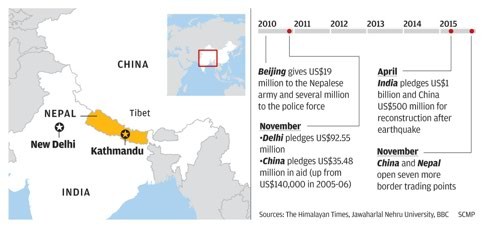By Debasish Roy Chowdhury (South China Morning Post, Jan 5)—New Delhi or Beijing? As Nepal’s new prime minister weighs his maiden foreign destination on assuming office, China finds itself in the middle of a high-stakes stand-off in South Asia, where its growing reach is prising open India’s hold over the region.
“Prime Minister K.P. Sharma Oli has been invited by both India and China. He can visit either first. No decision has been made yet,” the Nepalese premier’s media adviser Pramod Dahal told the South China Morning Post.
Dahal’s statement comes amid what Nepal is calling an undeclared economic blockade by India, cutting off fuel and other essential supplies to the country that acts as a buffer between China and India.
Nepal and India have been locked in a war of words since Nepal adopted its new constitution in September. Unhappy with their status as a result of the new constitution, ethnic groups on Nepal’s southern plains adjoining India have been protesting against Kathmandu, demanding amendments. Nepal alleges India, which is siding with the demands for constitutional changes, is encouraging the protests and using its border forces and customs to block goods traffic, starving landlocked Nepal of supplies, especially fuel.
China, whose help after April’s earthquake in Nepal earned it significant goodwill, lost no time in coming to its rescue again. Responding to Nepal’s appeals for help following the blockade, Beijing rushed fuel supplies and agreed to open the trade routes closed since the earthquake.
China shares its sensitive Tibet border with Nepal, making it strategically important for Beijing. Wary of dissent among Tibetan exiles living in Nepal, Beijing has been building up close ties with Kathmandu. Underscoring its growing presence, China overtook India as the biggest source of foreign direct investment in Nepal in 2014.
Nepal’s Deputy Prime Minister Kamal Thapa, after a trip to Beijing last month, announced Oli would visit China in the “beginning of 2016”. Apart from one recent exception of a Maoist leader, Nepal’s prime ministers have traditionally made New Delhi their first port of call, in a symbolic deference to the primacy of its southern neighbour. Thapa’s statement thus set off speculation that Kathmandu is formalising its tilt away from India.
But Kathmandu changed tack soon after Indian Prime Minister Narendra Modi invited Oli to visit India in a New Year’s Eve telephone conversation between them. “The PM may visit India first. But he won’t do so unless the blockade is lifted,” said Dahal, indicating Nepal’s willingness to use the trip to force Delhi’s hand.
The escalating diplomatic crisis in Nepal has come as a setback to the foreign policy thrust of Modi, who has visited Nepal twice since taking office. It also marks a new low in relations with India, which surrounds Nepal on three sides, reviving allegations of India’s big brother attitude towards its small neighbour.
“We have a rich, multidimensional relationship with India as a result of our shared geography, culture and history, and we want to continue it. But India must recognise that we are two different sovereign nations,” said Rajan Bhattarai, a member of parliament and Central Committee member of Oli’s Communist Party of Nepal (Unified Marxist-Leninist).
“We have a right to choose our own constitution, which was passed by an overwhelming majority. India cannot demand an amendment. We will decide what’s best for us.”
Bhattarai’s anger mirrors the nationalistic outrage the blockade has ignited.
“India’s action of coming down so harshly on democratic Nepal, creating an incredible humanitarian crisis and weakening the state structure, is an unprecedented action that warranted an equally unprecedented response, which is what explains Oli’s action,” said renowned Nepalese writer and editor, Kanak Mani Dixit, pointing out that it is the popular anger at home rather than the China card that is prompting Oli’s defiance.
“It is not politically feasible for the prime minister to visit India while the blockade is on.”
The economic hardships caused by the blockade have led to moves to deepen ties with China to ease reliance on India.
In October, Nepal signed an agreement with PetroChina to import fuel from China, ending Indian Oil Corporation’s monopoly in Nepal. During his December trip, Thapa’s deals with Beijing included a permanent arrangement for petroleum supplies from China, a transit treaty allowing Nepal access to Chinese ports, and stepping up trade. Nepal also abolished visas for Chinese tourists.
Dixit, however, does not spy a fundamental change in regional dynamics – yet. “Nepal cannot afford to loosen its ties with India as it’s impossible to replace India with China given our geography. The Chinese mainland is far away and common sense dictates we carry on our relationship with India. But Nepal’s China tilt has never been this pronounced and it’s entirely the result of New Delhi’s policy,” said Dixit.
“It will take time to diversify Nepal’s supply sources. Nepal’s situation vis-à-vis India means Nepal will not overnight convert itself into a pro-China holdout. But this still is a significant shift in South Asian geopolitics.”

